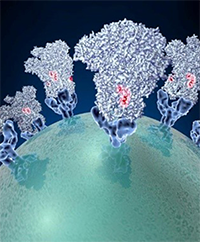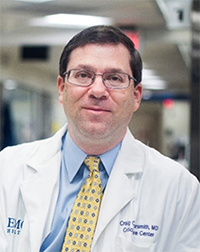 Spike proteins on the surface of a coronavirus. Credit: David Veesler, University of Washington.
Spike proteins on the surface of a coronavirus. Credit: David Veesler, University of Washington.
Since the start of the COVID-19 pandemic, researchers from many areas of biomedical science have worked together to learn how this new disease affects the human body, how to prevent its spread, and how to treat it. Severe cases of COVID-19 and cases of sepsis share many symptoms. Sepsis is the body’s overactive and extreme response to an infection. It’s unpredictable and can progress rapidly. Without prompt treatment, it can lead to tissue damage, organ failure, and death.
Sepsis has similarities with some cases of COVID-19, most likely because the two conditions trigger the same reactions at the cellular level. Researchers have studied these reactions in sepsis for many years.
“When we look back on 2020 and the speed with which progress was made against COVID-19, two features will stand out,” says John Younger, M.D., a member of the NIGMS Advisory Council who recently co-chaired a working group on advancing sepsis research. “The first is how quickly the biotechnology community came together to develop vaccine candidates. The second, and arguably the most immediately impactful, is how caregivers and clinical researchers were able to rapidly refine the care of COVID-19 patients based on decades of experience with sepsis.”
This post highlights a few of the many sepsis researchers supported by NIGMS who are applying their expertise to COVID-19.
Predicting Surges of Cases
 Dr. Vincent Liu. Credit: Kaiser Permanente.
Dr. Vincent Liu. Credit: Kaiser Permanente.
Hospitals need ways to predict the number of COVID-19 cases they’ll see in the near future so they can prepare. For years, Vincent Liu, M.D., a research scientist at the Kaiser Permanente Northern California Division of Research in Oakland, has developed mathematical models to identify patients at risk of developing sepsis. As the COVID-19 pandemic grew, he applied his modeling expertise to develop a “hot spotting score” for COVID-19 cases. The score is calculated using 10 variables that are collected as part of routine care, like the number of new positive cases, urgent and routine clinic visits for COVID-19 and other respiratory infections, or patients contacting their health care team through regional call centers or by email messages. The model successfully predicted the location, onset, and severity of spikes in COVID-19 admissions to 21 California hospitals up to 4 weeks before the spikes began. It’s currently being tested in other locations across the country.
Developing Treatment Recommendations
 Dr. Craig Coopersmith. Credit: Courtesy of HealthLeaders magazine.
Dr. Craig Coopersmith. Credit: Courtesy of HealthLeaders magazine.
Doctors and nurses follow treatment guidelines as they care for patients with any disease. Craig Coopersmith, M.D., a professor of surgery at Emory University School of Medicine in Atlanta, Georgia, has researched how sepsis impacts the gut and affects cancer patients. As a practicing physician and the director of the Emory Critical Care Center, Dr. Coopersmith has also personally treated many COVID-19 patients and has overseen Emory’s intensive care units (ICUs). “Sepsis, by definition, is life threatening. So, somebody who has expertise in sepsis is going to be very used to taking care of critically ill patients, which they can apply to patients with COVID-19,” he says. Dr. Coopersmith played a valuable role in creating the NIH COVID-19 treatment guidelines.
 Dr. Joseph Carcillo. Credit: University of Pittsburgh.
Dr. Joseph Carcillo. Credit: University of Pittsburgh.
Joseph Carcillo, M.D., a professor of critical care medicine and pediatrics at the University of Pittsburgh in Pennsylvania whose research focuses on sepsis, helped develop another set of recommendations for treating children with COVID-19. In collaboration with Surender Rajasekaran, M.D., Jeremy Prokop, Ph.D., and many other researchers, Dr. Carcillo also authored papers about the connection between sepsis and COVID-19, the ways that our genes may affect our bodies’ responses to the SARS-CoV-2 virus that causes COVID-19, and the proteins produced by SARS-CoV-2. He says that medical professionals need to watch for and treat the same severe symptoms in both sepsis and COVID-19: “All the things that lead to death in sepsis—inability to fight infection, blood clots in organs, and inflammation—are the things that lead to death in COVID-19.”
Helping Medical Professionals Make Decisions
 Dr. Melanie Wright. Credit: Idaho State University.
Dr. Melanie Wright. Credit: Idaho State University.
When doctors and nurses treat a patient, they need certain kinds of information (or data) about the patient to choose the best course of action. Depending on a patient’s diagnosis and many other factors, some data are more likely to be danger signals than others. For example, a fever may cause little concern when a patient first presents with COVID-19, but may be more concerning if it persists or recurs at a later time.
Melanie Wright, Ph.D., a research associate professor of pharmacy at Idaho State University in Pocatello, studies which patient data are most important to share with medical professionals and how best to present these data. Her newly NIGMS-funded project focuses on making the best use of artificial intelligence to increase clinicians’ awareness of danger signals in patients at risk for acute kidney injury and sepsis. As COVID-19 is a risk factor for sepsis and other serious complications such as respiratory depression, Dr. Wright is extending her investigation to the ways in which COVID-19 impacts what information clinicians need, when, and how. She’s also working with Idaho State University colleagues to examine how people in rural areas feel about a COVID-19 vaccine and the factors that may influence their choice to get one.
Zooming in on Complex Immune Responses
 Drs. Kenneth Remy (left) and Richard Hotchkiss (right). Credit: Washington University.
Drs. Kenneth Remy (left) and Richard Hotchkiss (right). Credit: Washington University.
Many patients with severe cases of COVID-19 experience overreactive immune system responses; in trying to destroy the virus, these responses harm the patients’ bodies. However, COVID-19 may ultimately suppress the immune system in some people, according to Kenneth Remy, M.D., an assistant professor of pediatrics, internal medicine, and adult/pediatric critical care medicine, and Richard Hotchkiss, M.D., a professor of anesthesiology, medicine, and surgery, at Washington University School of Medicine in St. Louis, Missouri. Dr. Hotchkiss has conducted research over many years that suggests some late-stage sepsis patients may experience an underactive immune system, similar to that in COVID-19, during part of their illness.
Drs. Remy and Hotchkiss have developed tools to predict how to treat sepsis patients based on the activity of their immune systems. They’ve learned that patients whose immune systems are overreacting respond better to certain treatments than those whose immune systems are suppressed. Based on experiments with COVID-19 patients, Drs. Remy and Hotchkiss believe that a similar approach could be applied to patients with that illness. Knowing how active a COVID-19 patient’s immune system is could help doctors determine the therapeutic strategies that are most likely to help them.
A View From the ICU
 Dr. Philip Efron. Credit: University of Florida.
Dr. Philip Efron. Credit: University of Florida.
Philip Efron, M.D., a professor of surgery and anesthesiology at the University of Florida College of Medicine in Gainesville, medical director for the University of Florida’s surgical ICUs, and head of the Laboratory for Inflammation Biology and Surgical Science, has studied the importance of particular cells in the immune response following sepsis, as well as complications in post-septic patients in the surgical ICU. Dr. Efron’s lab has collaborated with many other scientists and doctors who are conducting research on how different parts of the immune system respond to SARS-CoV-2.
According to Dr. Efron, both sepsis and COVID-19 affect certain groups of patients differently than others. “Due to its complexity, developing effective remedies for sepsis has been challenging over the past 20 years. Attempts to take a ‘one-size-fits-all’ approach to therapy has been ineffective,” he says. “With better understanding, it appears some aspect of personalized medicine is required for the treatment of any type of infection, and that’s the approach that we are taking with some of our COVID-19 analysis.”
For more information about COVID-19 and how researchers are working to combat it, please visit our COVID-19 webpage. To learn more about sepsis, take a look at our sepsis fact sheet and infographic.
The sepsis research described here was supported through NIGMS grants R35GM128672 (Liu); R01GM104323, R01GM072808, and T32GM095442 (Coopersmith); R01GM108618 (Carcillo); R01GM137083 (Wright); K08GM129763 (Remy); R35GM126928 (Hotchkiss); and R01GM113945 (Efron).

